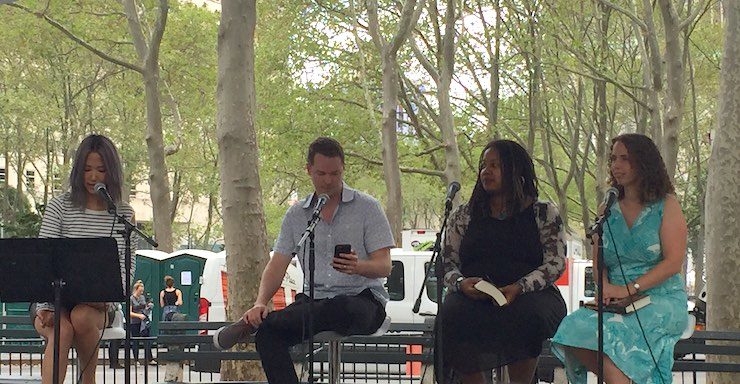Moderated by fantasy and science fiction writer Alice Sola Kim, this incredibly well-attended panel at the Brooklyn Book Festival featured Robert Jackson Bennett, N. K. Jemisin, and Sarah Beth Durst sitting down to discuss the use of politics, power dynamics, social systems, and threats in their various fantasy worlds—each of which includes dangers not just on a physical level, but in myriad forms such as colonial and social oppression, toxic social structures, geographic fragility, and magical/divine retribution. For an hour, the authors delved into their construction of these worlds, how and why they chose themes and struggles to focus on, and the ways in which they are able to skirt by people’s perceptions of the fantasy genre in order to explore real-world issues they find concerning or fascinating.
The panel started off with readings from each of the authors’ work. Bennett read a passage from his novel City of Stairs, detailing the history of his world, and how reality was irreparably warped when the Divinities died. Jemisin read from the prologue of her Hugo Award-winning novel, The Fifth Season; reading from the sequel, The Obelisk Gate, was out of the question, “since it has a spoiler for The Fifth Season literally on page one!” Durst finished by reading from the first chapter of her brand-new novel (out this month), The Queen of Blood, about a world in which the geography of the land is magical and beautiful beyond belief. “It would actually be a utopia if the nature elementals weren’t trying to murder all of humanity,” she said, laughing.
Kim then asked how each of their novels deals with very real-world concepts, and wanted to know how much of that was a conscious effort. Bennett and Jemisin both answered in similar veins: the lure of history intrigues both of them, and they work to interrogate that through their novels. For Bennett, he cited how history is often written by those in charge, those who have assumed control, or those trying to assume control. In City of Stairs, he tried to ground the narrative in the struggle that exists as both former oppressor and former oppressed try to control the flow of history, and rewrite it to their advantage—in this war between histories, the tension comes from the truth coming out in a way that will bite everyone in the ass.
Jemisin said that she reads history for fun, and one of the aspects that has always interested her is “the dichotomy of what it is that we think we know, versus what we know for a fact.” Much of written history is only dependable, in terms of methods and sources, within the scope of the last few hundreds years, whereas oral traditions can go back as far as thirty to forty thousand years. Her interest lies in tackling those two practices, and chipping away at the truth of what really happened. Durst’s answer centered around the idea of power as a central conceit: what is it, who has it, and most importantly for her story, how does it affect the individual and on what level?

This led directly to Kim’s next question, which was about the characters who survive in these harsh worlds, asking the authors to talk about the struggles their characters face, beyond living from day to day. All three answers revolved around the idea of hiding in plain sight. Bennett’s superspy is Shara Komayd, a small Southeast Asian woman with glasses whom everyone tends to dismiss as a secretary, when in fact the hulking Viking-like man (Sigrud, who everyone assumes is the hero) actually takes his orders from her. She has to constantly balance between who she is and who people expect her to be, without raising suspicion and without busting her mission. “She’s like the anti-James Bond,” Bennett said, “Someone who prefers books and a nice cup of tea to violence or intimidation. She has Sigrud to shoot people in the kneecaps!”
Jemisin said that the three protagonists in The Fifth Season have to constantly be aware of what they are, and how they act, since the slightest offense could get them killed. As orogenes, those magic users who can control kinetic energy, they’re trained to be useful to the world around them and use their abilities to protect others even while they’re leashed, abused, and punished for existing, brutalized because of the very possibility they could hurt someone or even destroy the continent. Durst said that her protagonist isn’t even the star of the show; she’s just someone trying to get by in the dangerous world she lives in. “She’s not the chosen one, she’s not the hero! She has to work her ass off just to survive, and her magic is her determination to work for the ability to simply live, and protect herself without losing or destroying who she is.”
Kim’s final question was about the relation of reality to their novels, asking, “What do you see every day that you transmute into an aspect of your fantasy world?” All three agreed that fantasy was a genre that, as Jemisin put it, “is a way to explore reality, to get past people’s barriers,” and talk about things happening in the world around us, without them necessarily even knowing. She noted that The Fifth Season, at its core, is a story exploring oppression, and ways in which societies evolve to contain or constrain groups of people, and ways in which to overthrow those systems of control.
Durst said that while she tries not to write with a certain message one way or another, fantasy is an opportunity to explore hope and empowerment, and that through characters and fantastical worlds, we have the opportunity to be braver, and come back to our world with that bravery intact. And finally, Bennett said that his Divine Cities series is really all about change, and that just as in our world, where the questions of empire and policy and society and the personal all overlap and evolve constantly, he’s trying to track the questioning process that drives change. “They all ask a question, and in a certain order: City of Stairs asks, ‘What should we do?’ City of Blades asks, ‘How should we do it?’ And the forthcoming City of Miracles asks, ‘Once it’s done, can we live with ourselves?’ I’m trying to ask: can people change, or do they get changed?”
Martin Cahill is a contributor to Tor.com, as well as Book Riot and Strange Horizons. He has fiction forthcoming at Beneath Ceaseless Skies and Fireside Fiction. You can follow his musings on Twitter @McflyCahill90. Tweet him about porters and stouts for the Fall, if you think Flash Season 3 will redeem Season 2, and how excited you are on a scale of 9-10 forArrival this November.










